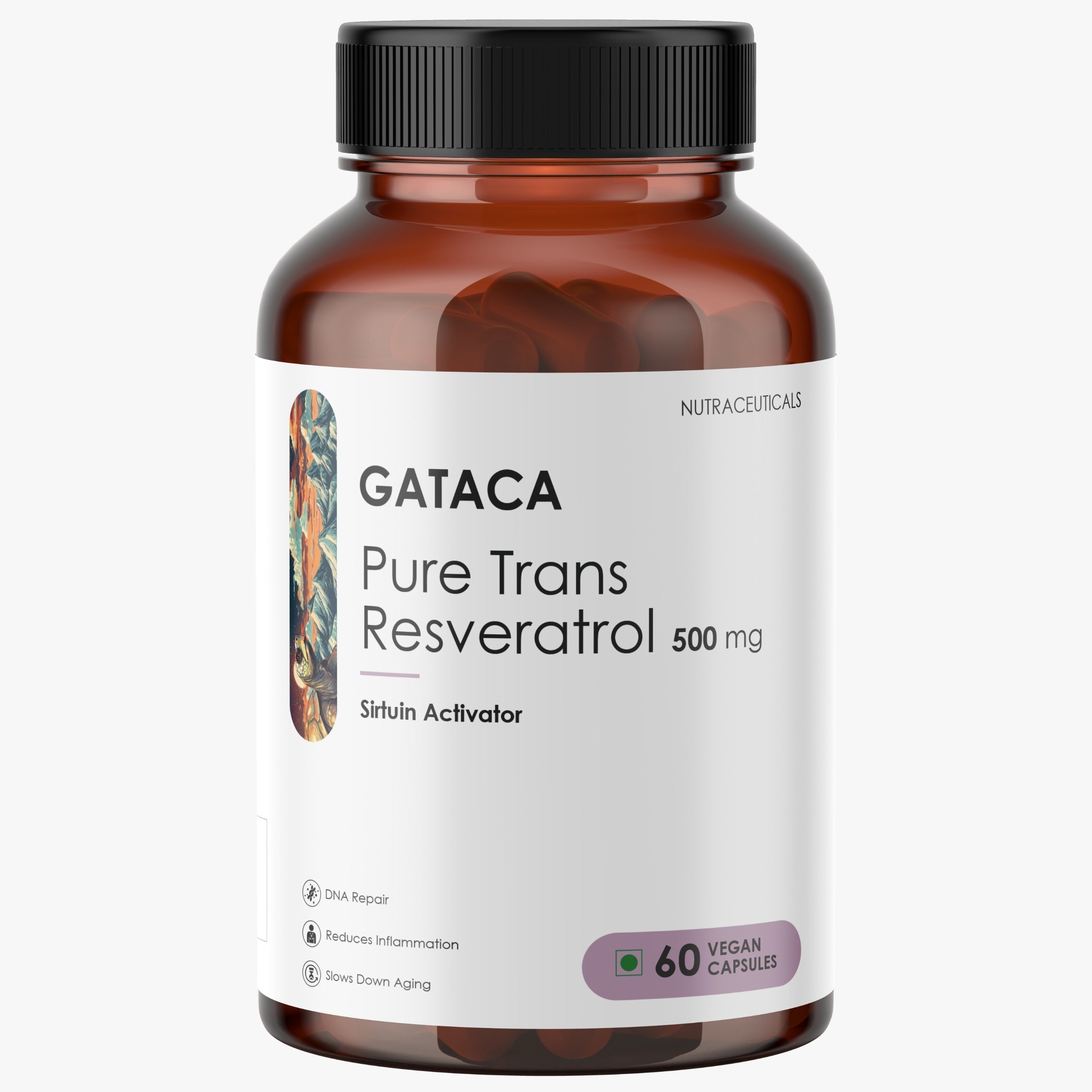Introduction
Trans-Resveratrol is a compound that plants normally synthesize when they are attacked by some infectious pathogens- think of it as an immunity protector for our photosynthesising friends.
But, this multifaceted compound can do so much more for us all, as its main strength lies in helping improve cellular function, reducing free radical production, preventing DNA damage and keeping cells healthy in the long run.
It also helps improve mitochondrial function, helping our cells produce more energy, more efficiently. Many preclinical studies show that it is a super promising compound that can be used as a supplement safely, so let us understand why it is so.
What Are The Benefits Of Trans-Resveratrol?
Trans-Resveratrol or 3,5,4′-trihydroxy-trans-stilbene (if you remember chemical nomenclature rules) is a stilbene produced by lots of plants. Since they are found in such minute amounts in peanuts, grapes and berries, it is not possible for you to be able to get the required amounts of trans-resveratrol from your diet.
A good example is this- you will need to eat about 10 kg of grapes if you need say 50 grams of it per day. The concentrations tend to vary when you look at different grape cultivars. Let us look at some of the most pronounced effects this compound has, on cellular function in our body-
- It is obviously great for the heart- studies have shown that it can help lower blood pressure- both systolic and diastolic when taken regularly. It can also help lower LDL levels and increase HDL levels- thus helping your circulatory system in the whole scheme of things.
- Resveratrol is good for the body as a whole as it helps improve circulation- which means all cells in the body get nutrients as they need.
- Trans-resveratrol helps reduce inflammatory cytokines in the body- like TNF-alpha or factors like NF-KB- that work upstream of many pathways.
- Trans-resveratrol helps cells remove superoxide radicals by being a great scavenger, while also helping them activate proteins like sirtuins- SIRT1 to be more specific. This means there is lesser oxidative stress systemically- which means lesser inflammation and better health in the long run.
- SIRT-1 has a global effect on the production of multiple enzymes that regulate oxidative pathways- like catalases, dismutases, peroxidases. This is how translate-resveratrol boosts mitochondrial function too.
- It has been shown to improve brain health and cerebral blood flow too.
- Other organs also benefit immensely with trans–resveratrol- like the liver, the kidneys, the pancreas (the beta cells that produce insulin are especially vulnerable to superoxides) due to its antioxidative properties.
- They also change how fat cells or adipocytes function- by reducing lipid accumulation in them. This means your metabolism is also improved.
How Does Trans-Resveratrol Improve Longevity?
By helping boost SIRT-1 production in the body, trans-resveratrol helps in a host of ways- all of which culminate in helping you reduce biological age and improve longevity. When there is less inflammation and oxidative stress- the metabolism of an organism begins to improve. This mimics the effects of ‘fasting’ or restricting calories- that can lead to better cellular repair of any damage caused due to normal wear and tear, or due to some other issue. As mitochondrial function improves, cellular energy levels increase- which means you have more energy to get through the day- without having to worry about a mid-day slump.
Conclusion
Trans-resveratrol is a very beneficial compound that will help your body function better- so that you feel superb! Trans-resveratrol is a pretty safe compound for regular consumption too- which means you can incorporate it into your routine, without any fear. Just talk to your doctor if you have any doubts or are on certain medications for comorbidities.
FAQs
1. What is trans-resveratrol, and how does it benefit health?
It is a polyphenol that is normally produced by plants to counteract an infectious agent. Various preclinical studies have shown promising results for reducing chronic inflammation, activating sirtuins in the body and helping cellular repair mechanisms work better in general.
2. When should I take trans-resveratrol for the best results?
Ideally, you should be taking the supplement after breakfast. This way, you will have lots of energy throughout the day. Remember to chase it down with some water.
3. Can trans-resveratrol support brain function and cognitive health?
Yes, recent studies have shown that older folk and menopausal women who supplement with trans-resveratrol show that it can help improve blood flow to the brain - which can greatly help when there is poor circulation due to advancing age.
4. What are the potential side effects or risks of taking trans-resveratrol?
High amounts of trans-resveratrol are generally well tolerated by most individuals, but you should watch out for side effects like nausea, vomiting, diarrhoea, higher heart rate, body aches etc. Consult a health specialist before starting this supplement.
5. How does trans-resveratrol compare to other antioxidants like quercetin?
Both trans-resveratrol and quercetin are powerful antioxidants in their own right, but their mechanism of action is slightly different. Also, quercetin is more abundantly found in food sources than trans-resveratrol. Both are especially helpful in reducing chronic inflammation in adipocytes- fat cells in the body.






